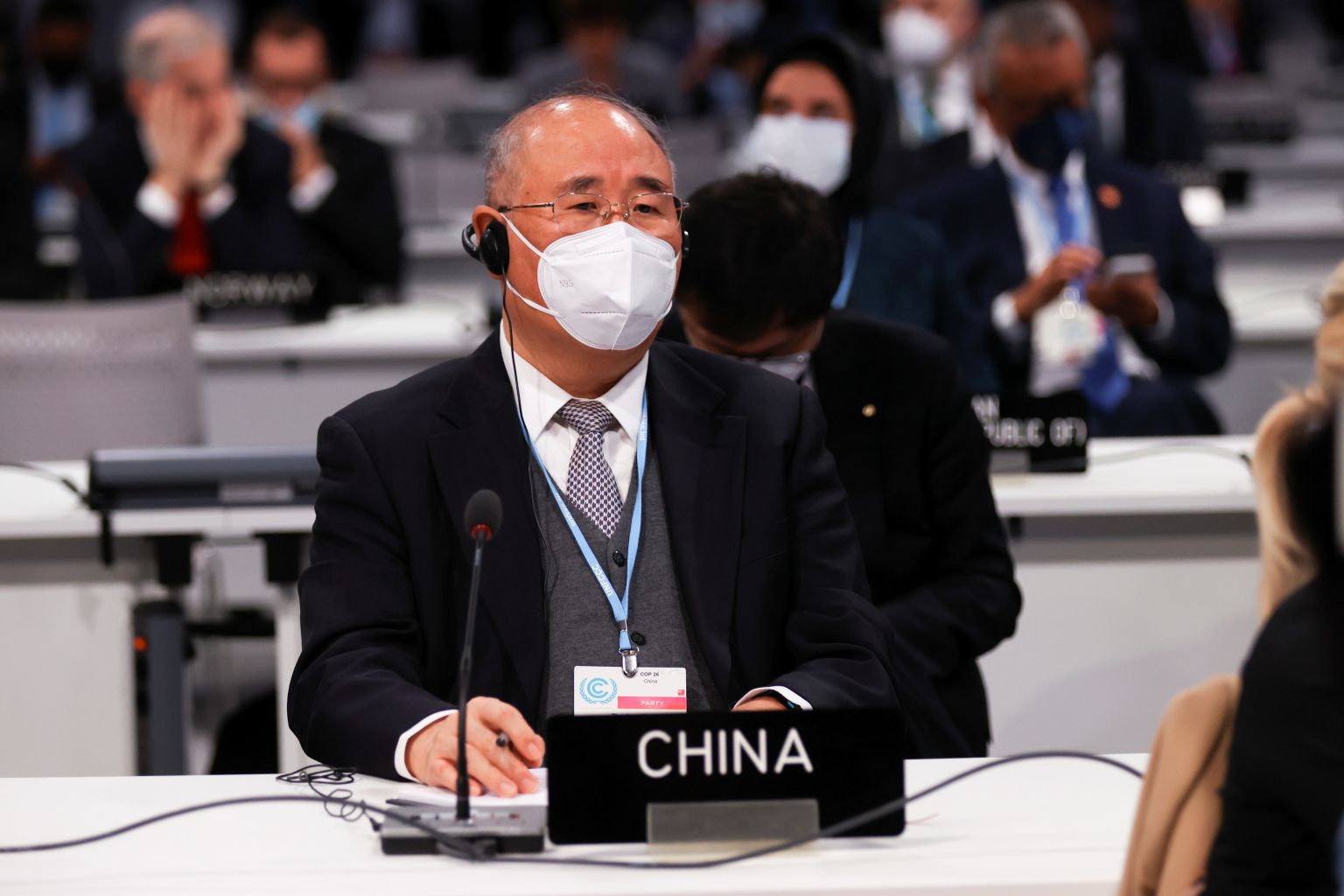China defends climate efforts, says energy revolution on track
Sign up now: Get ST's newsletters delivered to your inbox

Mr Xie Zhenhua, China's special envoy for climate change, attends the climate summit opening ceremony.
PHOTO: REUTERS
GLASGOW - China on Tuesday (Nov 2) defended its national efforts to fight climate change, calling its plans ambitious and dismissing criticism from some nations and green groups that it is not showing greater leadership at the COP26 climate talks in Scotland.
Mr Xie Zhenhua, China's special envoy for climate change, said Beijing's updated national climate plans, or Nationally Determined Contribution (NDC), ensured China would progressively reduce its reliance on coal and continue to ramp up investment in renewable energy to meet the nation's huge appetite for electricity.
China is the world's top greenhouse gas polluter and is responsible for about 28 per cent of humanity's carbon dioxide (CO2) emissions, mainly from burning fossil fuels.
It is the world's top coal consumer and producer, but also by far the planet's leading investor in renewable energy.
China recently firmed up the language of its NDC submitted to the United Nations as part of the Paris climate agreement process.
"Our NDC is that we need to achieve CO2 emissions peaking before 2030 and achieve carbon neutrality before 2060. That's a huge difference from 'around' or 'by'. I think it is already ambitious," Mr Xie told a press briefing.
He pointed out that over a period of about 30 years, the world's number two economy must go through an energy revolution to rapidly shift from fossil fuels to clean energy and that this requires huge investment, societal change, innovation and careful consideration of jobs and livelihoods.
China's President Xi Jinping, who is not attending the summit, said in a written statement to the conference on Monday that all nations should to take stronger action to jointly tackle the climate challenge. However, Mr Xi brought no new goals despite diplomatic pressure in the run-up to COP26.
Mr Xie said China has been working closely with many nations ahead of, and during, COP26, forging partnerships with the European Union and others and consulting closely with the United States. He pointed to 24 online meetings and three face-to-face meetings this year with US special climate envoy John Kerry.
The partnerships focus on technology, energy efficiency, energy storage, nature-based climate solutions and others.
Mr Xie said China's installed renewable energy capacity was now 890 gigawatts (GW), accounting for 32 per cent of the world's total and 53 per cent of the newly added renewable energy installed capacity globally.
In the past eight years, China been the world's top investor in renewable energy, he added.
But he also said China will likely need to build more coal-fired power stations to help meet energy needs, putting the nation at odds with global calls to end all coal-fired power investments.
China has the world's largest fleet of coal-fired power stations, which pump out massive amounts of CO2 - burning coal is the single largest source of mankind's CO2 pollution.
China has been under pressure to halt construction of new plants because of the climate risks.
"In some cases we may need to build some new coal-power plants to ensure the safety and stability of our power grid. But those newly built coal-fired power plants, they will all apply the highest possible standard in terms of technology, emissions and energy consumption," Mr Xie told the briefing.
China has simultaneously been retiring older and more polluting plants, he said. "In the process we have decommissioned a huge number of coal-fired power plants with a total installed capacity of 1,200 GW."
To compare, Singapore's total installed power generation capacity is about 12 GW and the United States' is about 1,120 GW.
Asked whether the current energy crunch in China could lead to a faster roll-out of renewable energy, Mr Xie said: "We are determined to increase the share of renewable energy in our energy mix. But we have to address a series of problems, including the safety of our grid, energy storage and development of CCUS technologies," referring to carbon capture, storage and utilisation.
He said China's focus on coal and gas to meet the energy supply crunch, which has led to electricity shortages, was temporary.
Mr Xie also took aim at developed nations for their long-standing failure to meet climate finance commitments.
Finance is a critical issue for poorer nations and has become a key issue of trust. Rich nations have not made good on their pledges, especially since they are historically most responsible for global warming.
'By now, 2021, developed countries have largely failed to honour their commitment of US$100 billion (S$135 billion) annually for climate finance."
More than a decade ago, wealthy nations pledged to provide poorer, vulnerable nations with US$100 billion annually from 2020 to help them green their economies and adapt to climate impacts, such as rising sea levels.
"They have failed to deliver their commitment, which has had a negative impact on the mutual trust between developed and developing countries."


